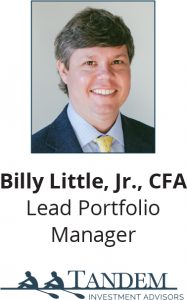TANDX::Institutional Shares

Q&A
 Q: The Fund is significantly underweight Information Technology. Why is that?
Q: The Fund is significantly underweight Information Technology. Why is that?
Our philosophy, process and investment discipline are all rooted in a “bottom-up” strategy. This means that everything we do starts at the company specific level. We are not a thematic or momentum-based manager, but instead we are a disciplined manager. Our process begins with a proprietary quantitative model that identifies stocks at extreme levels of over or under valuation based on several company specific growth and valuation metrics.
To answer your question specifically regarding the Information Technology sector, our allocation to this sector is simply a byproduct of the results from our quantitative model. Basically, we are not finding many opportunities in the Information Technology sector right now. Our model is not static or absolute in any way, so the output (i.e. companies to buy or sell) will change over time. However, currently there are very few companies in the Information Technology sector that make it through and are statistically undervalued according to our model that warrant us investing our cash in them.
Q: Are there particular holdings in the Fund that you believe would be impacted (negatively or positively) by a trade war?
To be honest, it technically doesn’t matter what I may think or believe. As I mentioned in the prior question, we are quantitatively focused and manage the Castle Tandem Fund according to a strict investment discipline. Everything we do is based on numbers, so if a trade war were to impact any of our holdings, we would see the effects and our quantitative model would digest the information accordingly. Our investment process was designed to remove biases and human emotion. Instead, we created a process that deals in facts and not speculation, or how I or another investment team member may feel on any particular day.
Generally speaking, I suspect our consumer discretionary holdings could come under some margin pressure if they are not able to successfully pass on the increased costs. On the flip side, I see very little reason for our positions in the solid waste industry to be impacted by a trade war. The Fund owns Republic Services, Inc. and Waste Connections, Inc. in this space. These holdings derive most of their revenue domestically and I would be hard pressed to see how we throw away less trash just because of a trade war.
Q: How do you feel about the current tradeoff between risk and reward in the equities market?
Again, not to beat a dead horse here, but being bottom-up driven, it matters very little to us if the “market” is up, down or sideways. Obviously, in the very short-term, market direction matters, because it gives you the chance to be opportunistic. However, in the long run, our holdings are bought on their own merit and their own ability to grow revenues, earnings and cash flows through any economic cycle. At any given time, a specific company might be significantly over or under valued regardless of what the broad equity market is doing. We will take advantage of individual opportunities as they come, but never based on where we think the broad equity market may or may not go.
With that said, the broad equity market is historically expensive on several metrics, specifically when viewing valuation from a sales perspective. With extremely low interest rates for the past 10 years, many companies have been able to lever up their balance sheets and financially engineer their earnings per share growth, while their top line barely grows. This is one reason why you see such a huge dispersion between sales and earnings valuations for the same company. Looking at valuations through this lens, one could argue that risk outweighs reward in the broad equity market.
However, we are not passive managers simply holding an index. We actively manage the Fund based on the signals from our quantitative model. It is our goal to buy low and sell high. By doing this, we are able to scale back in positions that are ranked significantly over valued, where the risks might outweigh the reward at current prices. In addition, we establish new positions or add to existing positions that are ranked significantly undervalued, where our research tells us the reward outweighs the risks. By actively managing a portfolio this way and by not having a mandate to be fully invested at any given time, our portfolio as a whole tends to be statistically more balanced between risk and return than the overall equity market.
The opinions expressed are those of the Fund’s Sub-Adviser and are not a recommendation for the purchase or sale of any security.
As of March 31, 2019, Republic Services, Inc. and Waste Connections, Inc. represented 2.81% and 1.95%, respectively, of the Castle Tandem Fund’s total net assets.
The Fund’s investment objectives, risks, charges and expenses must be considered carefully before investing. The prospectus contains this and other important information about the Fund, and it may be obtained by calling 1-877- 743- 7820, or visiting www.castleim.com. Read it carefully before investing. Distributed by Rafferty Capital Markets, LLC Garden City, NY 11530.
The risks associated with the Fund are detailed in the Fund’s Prospectus. Investments in the Fund are subject to common stock risk, sector risk, and investment management risk. The Fund’s focus on large-capitalization companies subjects the Fund to the risks that larger companies may not be able to attain the high growth rates of smaller companies. Because the Fund may invest in companies of any size, its share price could be more volatile than a fund that invests only in large-capitalization companies. Fund holdings and asset allocations are subject to change and are not recommendations to buy or sell any security.


Comments are closed.